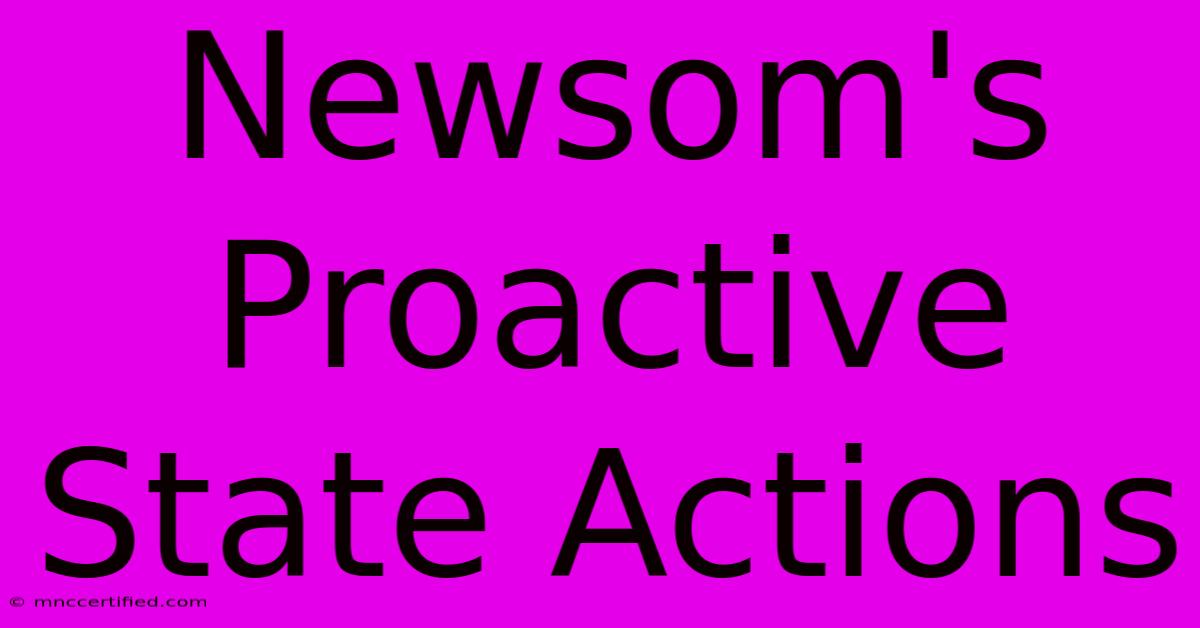Newsom's Proactive State Actions

Table of Contents
Newsom's Proactive State Actions: A Deep Dive into California's Bold Initiatives
California Governor Gavin Newsom has consistently positioned himself as a leader on progressive policy, implementing numerous proactive state actions across various sectors. This article delves into some of the most significant initiatives, analyzing their impact and potential long-term consequences. We'll explore the successes, challenges, and ongoing debates surrounding these bold moves.
Environmental Leadership: Combating Climate Change
Newsom's administration has prioritized combating climate change through ambitious goals and concrete actions. A key initiative is the California Climate Commitment, aiming to achieve carbon neutrality by 2045. This involves significant investments in renewable energy, electrification of transportation, and aggressive emission reduction targets.
Key Policies and Their Impact:
- Zero-Emission Vehicle Mandate: The state's ambitious mandate for zero-emission vehicles (ZEVs) is pushing the automotive industry towards a cleaner future. While facing challenges from automakers, the policy has stimulated innovation and investment in electric vehicle technology. This initiative directly impacts the California economy and global efforts towards emissions reduction.
- Investment in Renewable Energy: California has heavily invested in solar, wind, and other renewable energy sources. This has created jobs and reduced reliance on fossil fuels, though it has also faced challenges related to grid stability and energy storage. The economic impact of this green energy push is substantial and widely debated.
- Wildfire Prevention and Management: Facing increasingly devastating wildfires, Newsom has implemented measures to improve forest management, invest in wildfire suppression, and strengthen community resilience. These initiatives directly address the impact of climate change in California, and the ongoing success is crucial.
Economic Initiatives: Addressing Inequality and Fostering Growth
Newsom's economic agenda focuses on addressing income inequality and fostering economic growth. This involves a multifaceted approach encompassing minimum wage increases, affordable housing initiatives, and investments in education and workforce development.
Key Economic Policies and Their Outcomes:
- Minimum Wage Increases: California has steadily increased its minimum wage, aiming to improve the living standards of low-wage workers. The economic effects of this policy continue to be studied, with debates on its impact on employment and inflation.
- Affordable Housing Crisis: Tackling California's severe affordable housing shortage is a central focus. Newsom has proposed significant investments in affordable housing development and programs aimed at addressing homelessness. The scale of the crisis, however, presents a significant challenge.
- Investments in Education and Workforce Development: Improving education and workforce training programs is crucial for long-term economic success. Newsom has advocated for increased funding for community colleges and job training initiatives to equip Californians with the skills needed for a changing economy. This is a long-term investment with far-reaching implications for the California workforce.
Healthcare Access and Affordability: Expanding Coverage and Lowering Costs
Access to affordable healthcare remains a top priority. Newsom has worked to expand Medi-Cal coverage and implement measures to control healthcare costs.
Healthcare Policy Highlights and their Effectiveness:
- Medi-Cal Expansion: Extending Medi-Cal coverage to more Californians has expanded access to healthcare, but challenges remain in ensuring the system's sustainability and affordability.
- Prescription Drug Price Controls: Efforts to control prescription drug prices are underway, aimed at reducing healthcare costs for consumers. The long-term effectiveness of these measures is still being evaluated.
Challenges and Criticisms:
Despite the ambitious nature of Newsom's initiatives, several challenges and criticisms persist:
- Affordability: The high cost of living in California remains a major concern, impacting the effectiveness of many social programs.
- Implementation Challenges: Turning ambitious policy goals into tangible results often faces bureaucratic hurdles and implementation challenges.
- Political Opposition: Newsom's progressive agenda faces significant opposition from conservative groups and within the state legislature.
Conclusion: A Legacy in the Making
Gavin Newsom's proactive approach to governance has resulted in a series of significant initiatives aimed at addressing some of California's most pressing challenges. While facing numerous obstacles, these bold actions are shaping the state's future and are likely to have a lasting impact on its environment, economy, and social fabric. The long-term success of these policies will depend on continued political will, effective implementation, and ongoing adaptation to evolving circumstances. The ongoing debate surrounding these policies will continue to shape California’s political landscape for years to come.

Thank you for visiting our website wich cover about Newsom's Proactive State Actions. We hope the information provided has been useful to you. Feel free to contact us if you have any questions or need further assistance. See you next time and dont miss to bookmark.
Featured Posts
-
Rodman Estranged Relationship Revealed
Dec 19, 2024
-
Eddie Stobart Obituary A Tribute
Dec 19, 2024
-
Bank Of England Pauses Rates Inflation Up
Dec 19, 2024
-
Severe Human Bird Flu Case Confirmed In Us
Dec 19, 2024
-
Family Support Wiggins And His Kids
Dec 19, 2024